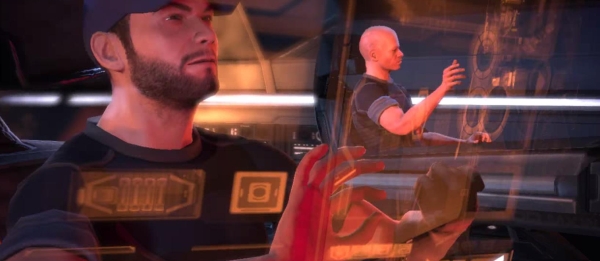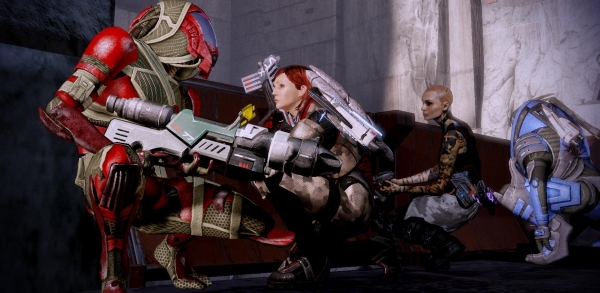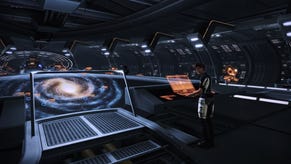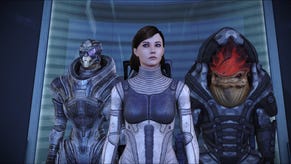Messiah Complex Prt 2: Towards Mass Effect 3
I left Mass Effect 2 in a similar mood to the way I left Dragon Age. I admired the craft, enjoyed it a lot but found myself dwelling on the question of “what next for Bioware?”. There's ribs of the old Bioware skeleton sticking out, but some of the changes in format feel – to me – like transitional ones, on the way to something else. This is about thinking about the something else.
What it isn't is what Tom Francis did with Bioshock, rewriting its ending to be more satisfying. It's more about trying to put a microscope on some philosophical bits of pieces which don't quite hang together. Mass Effect 2 played with this more than any Bioware game in ages. I'd like to see it pushed further.
Let's go back to Mass Effect: the Renegade/Paragon system is a revelation, in terms of actually rewarding entertaining behaviour. Traditionally, act good and bad equally, and you end up neutral-boring. Here, your major decisions boost your abilities in being a Renegade or a Paragon, as such allowing you to excel in lovely-fellow-tude and dog-kickery. But...
Well, I don't even want to touch on the fact any time a Renegade or Paragon option appears, it's basically a win-button. It does reduce the game down to it being a style thing of whether you want to go one way or another at any moment - both are often equally effective. In some ways, it works stylistically, making you equally as much of a decisive figure either way, but separating them totally does really remove much of the moral element to the game. The interrupts are wonderful... but they're rarely - as in, I never saw one, but there's apparently one - applied antagonistically. Offering a Paragon or Renegade option simultaneously would become a “What will I do now?” rather than “I'm going to press it to just see what I do. And why not? It'll almost certainly be better than what would happen if I didn't... and I'll end up with a more powerful character too”.
The last thing is my main problem with the system. All the other abilities in the game are based on freely applying skill points you earn when levelling up. So if you kill dudes, you can get any ability you want. The Renegade and Paragon skills are an exception, based around you practising them. In other words, every time you actually select the sensible, middle-ground action, your character becomes comparatively weaker, giving up "XP". You'll always be better off going for the extremes. Any attempt to make your character show complexity or even-handedness is, in terms of developing your character's power, a bad move.
There are a few solutions – the obvious one would be to weaponize the middle route, so that being reasonable is a skill too. Alpha Protocol, for all its apparent flaws, pretty much allows you to walk the game if you go for the “professional” options. Separating Paragon into its two component parts - “Plea by Ethics” and “Plea by Authority” would work here. One is about being nice. One is about being in charge. And the renegade – which picks up some of the “in charge” - becomes a purer plea-by-anti-ethics intimidation skill. You're already offering three choices. This would just make each one an actual feasible option.
Which leads to the crew. Arguably Bioware's biggest change is the step away from the much critiqued standard opening/branching-bit/end-game model. Instead, it has the long-mid-game about gathering your team. A dozen or more sub-quests before the game heads towards the conclusion. As I talked about last time, this does cause other problems.
Firstly, it extends the second act enormously, making it feel more like a TV show than a movie. To intro all the characters and give them a mission to gain their loyalty is a vast amount of content. Secondly, it still has what's been big head-scratcher in every Bioware game. In short: what the fuck are all these idiots doing when I'm off saving the universe? Let's pile-on to the Balrog/Borg-knock-off instead of going in with a couple of mates.
It was worse in Dragon Age, where people are just sitting around a camp, polishing their swords and braiding their hair when you're off saving the world. At least in Mass Effect 2, there's the theory that they have a ship to look after. Dragon Age was desperately in need for something to keep your companions busy – the one really smart idea in Neverwinter Nights 2 was the mid-game where you run a castle, which is a sensible place to leave your friends... though it'd be better if the castle had to be defended at all costs. If you're going to do something as openly atmosphere-shattering as leaving most your friends behind, at least work in some manner of justification in the fiction.
There's a couple of other ways they could go, however.
Firstly, say fuck it and let you bring them all along. Or at least more of them. The interesting thing about Mass Effect 2 is that it's streamlined your companion management to such a level that I personally could have handled another couple of team-mates. If I could have a mob of them along, I suspect I'd accept some further streamlining, swapping scale of conflicts for the intricacy.
Especially in the end-game, where the game explicitly talks about splitting your team into two halves, I was hoping for a surprise mission with a load of your friends along. You can work out in-game justifications to bring the team size down.... but I did crave to have a Omaha Beach moment. On the action side, Mass Effect 2 is a game about spectacle. I'd be interested to see a game which managed to be as smart as ME2 is, while having the genuine scale of a Gears of War or Halo. In fact, if you asked my late-nineties self, ME2 is very much what I'd imagine the early-00s equivalent of Halo would play like.
The second approach is to say fuck it, and just lose half your crew. Basically, the Planescape Torment approach of having fewer, but better detailed characters. Rather than having a pair of character specific missions, you could have four. Alternatively, you could only have the same amount of character-specific missions, but use the extra resources to expand the main arc of the plot. With less companions, one of the major critiques of Mass Effect 2 – the relatively limited number of missions which actually have anything to do with your actual objective – could be answered.
Also, if you're willing to let me go well into Back-seat designer territory, there's another, more extreme option I'd love to see someone try. Keep the same number of companions. Just half the amount you have in any given game, with you getting a selection of five or six to form the middle-act. The game is shorter, but doesn't have the over-extended middle arc, and it rewards (and encourages, because the game is a more manageable length) replaying to get a different selection of chums. You could make it a standard set first time around. You could make it entirely random. You could make it selectable from the full list once you've played them. You could experiment to see how different characters actually worked together or argued. And you also avoid all the problems described above of “What on earth are all these people you're recruiting actually DOING while I'm saving the universe?”
(I'm aware why no-one in the mainstream would do this, by the way. The idea of resources not being seen is something which sends people into a panic. But I still think it's interesting.)
And now we head to the thing which left me a little sad about Mass Effect 2's ending. Put simply, it's a suicide mission which simply isn't. It's actually a perfectly sensible mission. You do the bare minimum of preparation and planning – get the ship upgrades, do the loyalty missions and select the reasonable person for any task when actually on the mission – and pretty much everyone will get out alive. After the build up, all the promise of darkness and drama, this was disappointing. I didn't deserve the prize.
Solutions to this?
Obvious one: go less dark. This is a game which called back to the Seven Samurai, the Dirty Dozen and – implicitly, being the second part in a sci-fi trilogy – the Empire Strikes Back. The ease of the ending betrays that. However, if Bioware want to make Star Wars... well, make Star Wars. When you've got a crew as genuinely broken as the one in Mass Effect 2, you're primed for darkness. I stress: this is a game where the comedy character has committed an act of genocide. Tone back the tragic characters and you're not primed for tragedy. From the quotes that have come out so far, this seems to be the way Bioware are going.
There's other ways they could have gone. Less obviously, commit to the theme. It wasn't that I got everyone bar-one person out alive which was the problem. It was that I so easily got everyone bar-one out alive. I'm probably a better player than average, but – as explained above – the things which made me do as well as I did weren't things which demanded much skill or thought.
The original Mass Effect threw in a Sophie's Choice situation where one character died and one lived. While I thought it actually worked, I don't think this is necessary to do it that directly. I think you just needed more decisions before you went to the final mission about the nature of the mission. Where are you going to go into the target? What equipment are you going to take on your ship? What intel are you trying to gather? Having a choice of non-crew allies or equipment to gather, with you getting one meaning you can't get the other. That kind of thing.
In other words, turn the game into less the Seven Samurai and more Oceans Eleven. Getting the team is part of the battle. Having the plan and the equipment thereof is the other. This could have the dual effect of making any of your crew's death feel more directly attached to your decisions - “Well, I did think it was a good idea to send their team through the route which I knew was dangerous” - and making the middle-act more obviously related to the conclusion.
And now... offing the crew.
Last time, I was a little extravagant in my choice of metaphor for what the supporting cast in any fiction are for. As in, supporting casts exist for us to care about and then be killed. It's not exactly true. Supporting cast exist to be threatened. Fear of them being hurt. In a lighter-leaning story, we know they'll probably get away, but our sympathy makes us care even despite of that. In a darker-leaning story, we're petrified for them. We know they can die. Hell, we know they'll probably die.
This makes the concept of “Loyalty missions” is another somewhat odd one. They made a team-mate loyal to you. That's a deceptive labelling. It does no such thing. A better description may be “focused”. As in, their mind is entirely on the mission so they'll perform better. “Loyalty” would imply a character wouldn't betray you or would die for you. And they probably would. But the irony is that a character who is loyal has far less chance of dying for you...
Which leads to a few ideas for a meaningful character death. If the mission is harder to get everyone else out alive, a loyal character – with true 100% loyalty being harder to achieve – would end up wanting to sacrifice themselves to save everybody else. This would all depend on the plan you put into play and where the risks were taken. It'd be a meaningful death, and a high-point of heroism for that character's life – because heroism is sacrifice, or the willingness to make sacrifices. It would be an important moment for the character – and one which through your actions you helped create, though arguably with less guilt actually put at your feet. After all, it was their decision.
Bioware seem sensitive to those who are upset over any deaths at all. I'd note that in geek media, fan outrage is a necessary thing to face. Let's take comics, with Miller receiving death-threats about him killing the woman they loved when he killed Elektra in his Daredevil run. It was the critical apex of the run, and still talked about today. You cannot try to create Macbeth or Hamlet and turn it into Measure for Measure or Midsummer Night's Dream. Focus Testing would have given Romeo and Juilet a happy ending. And, it should be noted, all the story experiences that are cited as great in games are tragic ones. Ico, Shadow of the Colossus, Planescape Torment, Another World - all tragedies.
Have faith in your story, and don't deny it. If this is the sort of game you want to make, you have to commit to it.
Which leads to the most radical idea I'm going to throw out here, and the one which gave this article its title. As I said in the first part, I wanted them all to live but was disappointed that it was all so easy. I was disappointed my devotion wasn't questioned. I'd have done anything to save them.
Would I, really?
It's a game where your character progresses into the next game. Your character's survival has meaning. The mission is at its climax. Maybe some have fallen. Maybe some haven't. But your other team is trapped, sent on a necessary diversion. You know they're doomed. But then an option opens up – that if you go to a certain place, and strike as well as you can, they can escape. Your friends – all your friends – will get out.
You won't.
I can save them all... or I can save my save.
Would I have managed to make that sacrifice? I don't know. But I'd love to have seen a game offer me my nails, my cross and ask to hammer them home.














